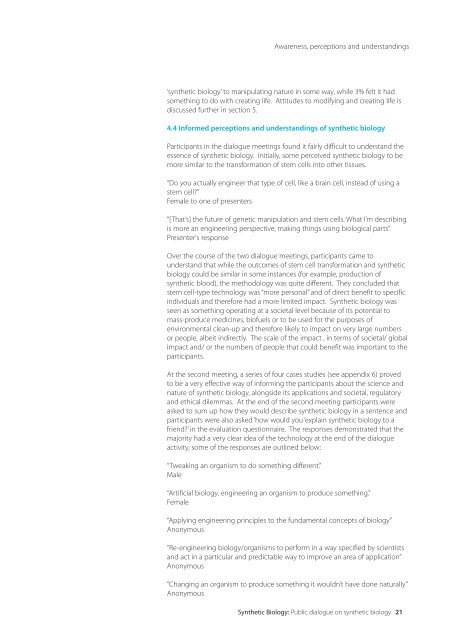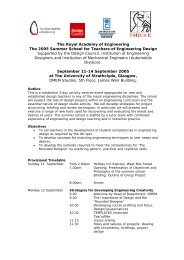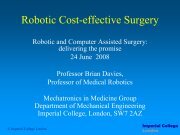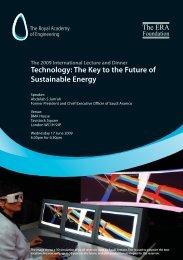Synthetic Biology: Public dialogue on synthetic biology
Synthetic Biology: Public dialogue on synthetic biology
Synthetic Biology: Public dialogue on synthetic biology
Create successful ePaper yourself
Turn your PDF publications into a flip-book with our unique Google optimized e-Paper software.
Awareness, percepti<strong>on</strong>s and understandings<br />
‘<strong>synthetic</strong> <strong>biology</strong>’ to manipulating nature in some way, while 3% felt it had<br />
something to do with creating life. Attitudes to modifying and creating life is<br />
discussed further in secti<strong>on</strong> 5.<br />
4.4 Informed percepti<strong>on</strong>s and understandings of <strong>synthetic</strong> <strong>biology</strong><br />
Participants in the <str<strong>on</strong>g>dialogue</str<strong>on</strong>g> meetings found it fairly difficult to understand the<br />
essence of <strong>synthetic</strong> <strong>biology</strong>. Initially, some perceived <strong>synthetic</strong> <strong>biology</strong> to be<br />
more similar to the transformati<strong>on</strong> of stem cells into other tissues.<br />
“Do you actually engineer that type of cell, like a brain cell, instead of using a<br />
stem cell?”<br />
Female to <strong>on</strong>e of presenters<br />
“[That’s] the future of genetic manipulati<strong>on</strong> and stem cells. What I’m describing<br />
is more an engineering perspective, making things using biological parts”.<br />
Presenter's resp<strong>on</strong>se<br />
Over the course of the two <str<strong>on</strong>g>dialogue</str<strong>on</strong>g> meetings, participants came to<br />
understand that while the outcomes of stem cell transformati<strong>on</strong> and <strong>synthetic</strong><br />
<strong>biology</strong> could be similar in some instances (for example, producti<strong>on</strong> of<br />
<strong>synthetic</strong> blood), the methodology was quite different. They c<strong>on</strong>cluded that<br />
stem cell-type technology was “more pers<strong>on</strong>al” and of direct benefit to specific<br />
individuals and therefore had a more limited impact. <str<strong>on</strong>g>Synthetic</str<strong>on</strong>g> <strong>biology</strong> was<br />
seen as something operating at a societal level because of its potential to<br />
mass-produce medicines, biofuels or to be used for the purposes of<br />
envir<strong>on</strong>mental clean-up and therefore likely to impact <strong>on</strong> very large numbers<br />
or people, albeit indirectly. The scale of the impact , in terms of societal/ global<br />
impact and/ or the numbers of people that could benefit was important to the<br />
participants.<br />
At the sec<strong>on</strong>d meeting, a series of four cases studies (see appendix 6) proved<br />
to be a very effective way of informing the participants about the science and<br />
nature of <strong>synthetic</strong> <strong>biology</strong>, al<strong>on</strong>gside its applicati<strong>on</strong>s and societal, regulatory<br />
and ethical dilemmas. At the end of the sec<strong>on</strong>d meeting participants were<br />
asked to sum up how they would describe <strong>synthetic</strong> <strong>biology</strong> in a sentence and<br />
participants were also asked ‘how would you ‘explain <strong>synthetic</strong> <strong>biology</strong> to a<br />
friend?’ in the evaluati<strong>on</strong> questi<strong>on</strong>naire. The resp<strong>on</strong>ses dem<strong>on</strong>strated that the<br />
majority had a very clear idea of the technology at the end of the <str<strong>on</strong>g>dialogue</str<strong>on</strong>g><br />
activity, some of the resp<strong>on</strong>ses are outlined below:<br />
“Tweaking an organism to do something different.”<br />
Male<br />
“Artificial <strong>biology</strong>, engineering an organism to produce something.”<br />
Female<br />
“Applying engineering principles to the fundamental c<strong>on</strong>cepts of <strong>biology</strong>”<br />
An<strong>on</strong>ymous<br />
“Re-engineering <strong>biology</strong>/organisms to perform in a way specified by scientists<br />
and act in a particular and predictable way to improve an area of applicati<strong>on</strong>”<br />
An<strong>on</strong>ymous<br />
“Changing an organism to produce something it wouldn’t have d<strong>on</strong>e naturally”<br />
An<strong>on</strong>ymous<br />
<str<strong>on</strong>g>Synthetic</str<strong>on</strong>g> <str<strong>on</strong>g>Biology</str<strong>on</strong>g>: <str<strong>on</strong>g>Public</str<strong>on</strong>g> <str<strong>on</strong>g>dialogue</str<strong>on</strong>g> <strong>on</strong> <strong>synthetic</strong> <strong>biology</strong> 21

















